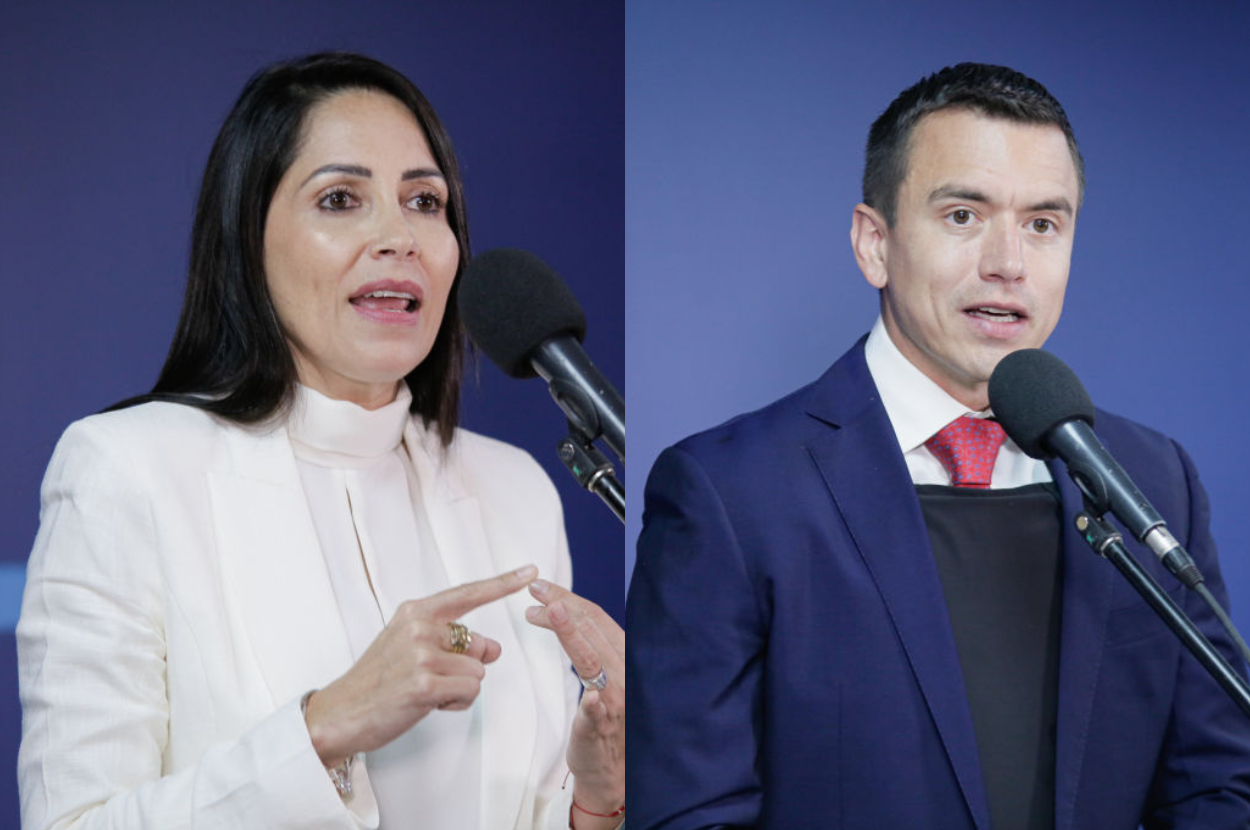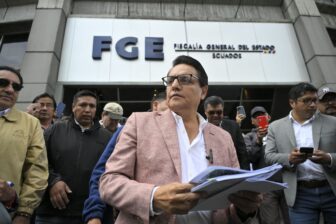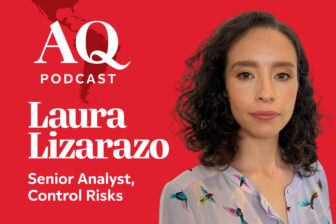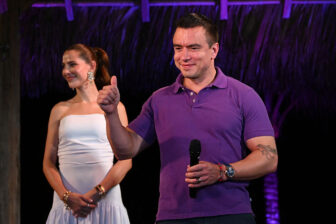Amid record organized crime-related violence, Ecuadorians showed a high level of participation in the August 20 snap presidential election. Candidates Luisa González, for Movimiento Revolución Ciudadana (33%), and Daniel Noboa (23.7%), the son of a banana tycoon running under Acción Democrática Nacional, will contest a runoff on October 15.
More than 100,000 police and soldiers were deployed across the country to oversee voters and candidates. Christian Zurita, who ran replacing Fernando Villavicencio, the candidate assassinated on August 9, received 16.5% of the vote. Zurita attended his polling station wearing a helmet, a bulletproof jacket and was escorted by several soldiers carrying heavy weapons.
The two referendums on the ballot, one asking voters whether oil extraction should stop in the Yasuní National Park in the Amazon, and the second one consulting Quito’s voters whether mining should be banned in the Chocó Andino region were approved.
The nation faces an unprecedented security crisis and its bloodiest era: In the first half of the year, the National Police tallied 3,568 violent deaths, more than the 2,042 reported during the same period last year.
Sebastián Hurtado, president of Prófitas, Quito-based political risk consultancy
The results of today’s presidential and legislative elections in Ecuador were driven by general frustration with the political status quo, an unprecedented security crisis, and the shocking assassination of presidential candidate Fernando Villavicencio over a week ago. The killing upended the election by undermining a single-round victory for correísmo whom some blamed for the death of a longtime critic- and by boosting right-wing outsider candidates.
A competitive second-round election is expected, with Noboa, who ran a non-confrontational political campaign at a time of unprecedented polarization, starting with an edge over Gonzalez due to his “outsider” profile at a time when most people want to move beyond the correísmo-anticorreísmo dynamic of the last 15 years. However, the nearly two-month campaign period may still hold surprises that could affect the outcome, especially since both candidates are little known and have significant political liabilities. At the same time, new shocking security events could take place.
The results also signal a likely fragmented Congress, where the correístas will boast the largest block without a clear majority. The good performance of right-wing candidates on Sunday’s vote and the diminished representation of left-wing parties like Pachakutik and Izquierda Democrática may lead to a less left-leaning Congress than the one dismissed in May.
Two referendums banning oil and mineral extraction within two environmentally sensitive regions also received overwhelming support. While obscured behind the dramatic presidential campaign, the referendum result represents a significant political setback for the future development of extractive industries in Ecuador, one of the few sources of short-term significant private investment and government revenue growth.
This unusual and unprecedented election cycle has been shaped by tragedy and a highly polarized political landscape. Ecuadorians should hope that whoever wins the runoff receives a robust political mandate. They can bridge the political divide and build governability, a prerequisite to dealing with the significant economic and security challenges this nation will face in the coming years.
Laura Lizarazo, senior analyst, Control Risks
Ecuadorians went to the polls on August 20 for snap elections amid a very unusual climate: the country currently faces a security crisis that has rapidly transformed a formerly peaceful nation into one of the most violent in the hemisphere. Citizens voted to choose a new head of state and 137 lawmakers to complete the 2021-2025 term that was abruptly interrupted last May when incumbent President Guillermo Lasso dissolved the legislature to avoid being impeached. They also had to decide whether to continue oil exploitation in Yasuní, a protected natural area in the Ecuadorian Amazon, and mining in the Andean Chocó region (a decision made only by the inhabitants of the metropolitan district of Quito).
Results for the presidential race came in with a surprise: after ranking last in most polls, 35-year-old Daniel Noboa, former Assembly member (2021-2023) and son of one of the richest men in Ecuador, will dispute the presidency in a tight run-off on October 15. He will face the anticipated frontrunner, Citizen Revolution candidate and former President Rafael Correa’s (2007-17) protégée Luisa González.
As in the past decade, the deeply rooted divide between Correa’s supporters and his detractors will shape the race. With the largest and most stable supporter base in Ecuador (a 55% favorability, according to a survey by pollster Gallup), up until March 2023 Correa was still the most popular politician in the country. However, he remains a highly divisive figure. Wide segments of the population fiercely reject him and will most certainly vote for Noboa to avoid the comeback of his party.
On the other hand, Noboa is a moderately known but much less polemic politician who will likely gain traction in the coming months with a balanced discourse and public figure: he was the only candidate that performed well in the August 13 presidential debate (even gaining Correa’s compliments), projecting a confident, composed and informed image. After getting the results on the night of August 20, Noboa announced that he would resume visits to Ecuador’s underserved and most isolated communities the following day, reinforcing the hands-on attitude he tried to display during the 11-day campaign. He did not immediately rule out the possibility of starting a conversation with Jan Topic, the candidate who ranked fourth, to make him part of his cabinet – possibly as interior minister. This move would further strengthen his campaign as Topic promised an “iron-hand” approach to address unprecedented crime and violence. These factors will likely complicate a smooth, overwhelming correísmo win, making this campaign a highly polarized and tight race.
Alejandro Arreaza, Andean economist at Barclays
Ecuador’s first-round election results confirm that correísmo is the largest minority in a fragmented system, but it faces significant challenges in forming a majority coalition. Luisa González ended up obtaining practically the same one-third of the vote that correísmo got in the 2021 presidential contest and this February’s local elections, meaning that she has not been able to expand her support base.
Although votes may not be perfectly transferable and the Ecuadorian political scenario remains volatile, Daniel Noboa has a clearer path to build a majority heading into the runoff. In principle, it’d be easier for him to capture the votes of the other center-right candidates, which in the aggregate, obtained 63% of the vote share.
The easiest way for González to gain additional traction heading into October is to try to capture the votes of the Indigenous leader, Yaku Pérez, who finished sixth with just 4% of the vote. Still, even with this support, the Movimiento Revolución Ciudadana candidate will not have enough to win the final contest. Even if correísmo were to win the second round, the election result highlights the institutional constraints it might face, which could make it more difficult to make radical changes.
The election of a new national assembly was also on the ballot. Although details about the distribution of the seats are still pending, preliminary results also suggest a fragmented legislature in which no party would have a majority. Correísmo might have the largest number of seats but would still fall short of 50%. In aggregate, the left-leaning parties would see a reduction in their share as the Indigenous party, Pachakutik, was one of the biggest losers in the election. Therefore, the center-right parties appear set to have a larger share of the seats in the new assembly. Although correísmo would still have the option of calling a constitutional assembly to pursue its agenda, it could be a more challenging process, especially if it does not receive a clear mandate from the electorate to do so. The election results may not be conclusive, but they significantly improve the balance of risks. Given how volatile Ecuadorian politics are and the relatively long campaign ahead of the runoff, the race remains open.








